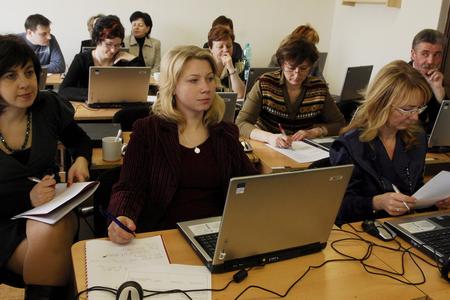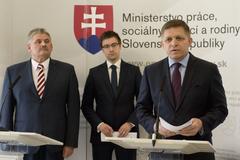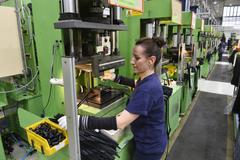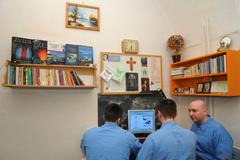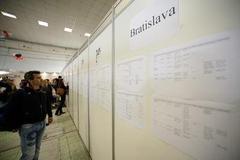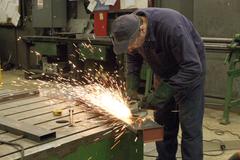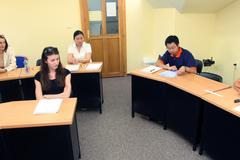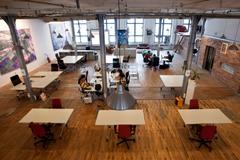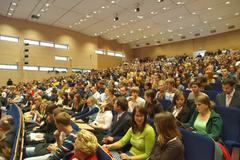Career and HR, page 10
Employment news from Slovakia
Employee education has benefits
Both businesses and workers recognise the benefits of lifelong learning.
Jobless rate in Slovakia continues to fall
To push the jobless rate below 7-8 percent will be difficult, said PM Fico.
Few Slovaks return from abroad
In December 2015, more than 300,000 Slovaks worked abroad and only a few of them wish to return, the TASR newswire wrote.
Foreigners fill job gaps
Employers in Slovakia fish for labour force also beyond borders.
Firms look online for the best staff
Up to 300 million jobs are browsed via Google, Yahoo and Bing every day, while the popularity of social networks keeps growing.
Behind bars but looking for regular work
Prisoners are obliged to work, but finding jobs proves to be a challenge.
Shared service centres hiring
SHARED service centres (SSCs) in Visegrad Group (V4) countries (Slovakia, the Czech Republic, Poland, Hungary) mark a boom: companies are hiring people and expanding their activities.
Employment agencies play key role
Personnel leasing cuts administrative costs.
Jobless rate below 10 percent
The Labour Ministry promises to continue in pro-social policies
Benefits for employees and employers hiring people in poor regions
Benefits for employees and employers hiring people in poor regions
Do you master your time?
If only I had more time... I really have no time for this.. I am running out of time on this task.. Sorry I need to run... Every day we say things like this in our work and private lives. First thing in the morning we push our kids out of the house with “hurry up, we are late...” continue at work being late and not fully prepared for meetings. During lunch we eat whatever is available quickly, if we eat anything at all, and then go off to more meetings or tasks while our inbox has been filling up with important messages.
Laws on agency employment change
Employment through agencies is a common way of flexible work arrangement in western Europe and America. However, in Slovakia it is perceived rather negatively, due to illegal practices of a great number of agents who apply various tricks to try and rob both employees and the state of benefits and tax revenue.
Stemming brain drain
In search of a good education and job opportunities, Martin Kanka, a 25-year-old Slovak, decided to move 60 km from Bratislava to Vienna.
Foreigners at work
What does a company need to do when employing a foreign national?
Labour market remains rather inflexible
Although home office or job sharing are gradually replacing traditional forms to favour work-life balance, local culture holds Slovakia-based employers tied to full-time jobs
Human resources sector highlights
A selection of surveys, polls and research conducted in the HR sector from January 2015 to February 2016
Slovaks reluctant to commute
Personal ownership, family reasons and unwillingness to spend hours commuting to work are the most cited reasons for low internal labour mobility in Slovakia. Though companies have adopted measures to attract employees from more distant places and the Labour Ministry claims to have strategies to support labour mobility, experts point to several gaps in the system. “The reasons are the missing tradition in commuting to work and illegal labour, especially regarding the unemployed,” Martin Hošták, general secretary of the National Union of Employers, told The Slovak Spectator.
Universities also have to cooperate with companies
Not only secondary school students, but also young people at universities need to spend some time directly in companies to obtain some practical experiences, representatives of the business sector agree.
Women’s salaries 22 percent lower than men’s
WOMEN on average earn €239 gross less than men, while in some occupations the difference is even higher: by more than one-third.
Labour market, wages in flux
Higher prices should also mean higher quality. For the Slovak labour market, this means the economy should get more innovative and R&D-oriented as the costs of labour go up.
- Ambulance hit by Russian drone goes on display in centre of Bratislava
- Slovakia’s public finances remain in deep trouble
- Confetti, chants and history: Hejková’s dream goodbye after nearly 40 years at the top
- Bratislava’s embassy-backed events you don’t want to miss
- US giant pulls plug on Slovak factory, axing 137 jobs
- “Return not,” the ocean cried. But I returned for her
- The British Film Institute shines a light on Slovak cinema’s boldest chapter Video
- Hundreds of people ousted from Bratislava’s Volkswagen
- “Return not,” the ocean cried. But I returned for her
- Ambulance hit by Russian drone goes on display in centre of Bratislava
- Bratislava’s embassy-backed events you don’t want to miss
- The British Film Institute shines a light on Slovak cinema’s boldest chapter Video
- Slovakia's latest basketball star is destined for great things in the USA
- When to shop over Easter: Opening hours for supermarkets in Slovakia
- 3 free things to do in Bratislava in the next seven days
- US giant pulls plug on Slovak factory, axing 137 jobs
- 3 free things to do in Bratislava in the next seven days
- “Return not,” the ocean cried. But I returned for her
- Hundreds of people ousted from Bratislava’s Volkswagen
- The British Film Institute shines a light on Slovak cinema’s boldest chapter Video
- Weekend: What to make of Easter in Slovakia
- News digest: Finns air unseen video of Fico shooting, PM’s bloody jacket driven away by minister
- US giant pulls plug on Slovak factory, axing 137 jobs
- Slovakia's latest basketball star is destined for great things in the USA
- “Return not,” the ocean cried. But I returned for her
- German shoemaker Lowa joins wave of factory closures in Slovakia
- 3 free things to do in Bratislava in the next seven days
- A café in an ice cellar, sand dunes and a flower shop at the border
- US giant pulls plug on Slovak factory, axing 137 jobs
- Hundreds of people ousted from Bratislava’s Volkswagen
- When to shop over Easter: Opening hours for supermarkets in Slovakia
- Danish shoemaker to shut Slovak factory, axing 650 jobs in fresh blow to struggling region
- Confetti, chants and history: Hejková’s dream goodbye after nearly 40 years at the top
- Slovakia’s public finances remain in deep trouble
- Ambulance hit by Russian drone goes on display in centre of Bratislava
- Why this gorge deserves a spot on your bucket list Photo
- The British Film Institute shines a light on Slovak cinema’s boldest chapter Video
- Bratislava’s embassy-backed events you don’t want to miss
- Water supply to be cut in parts of Bratislava’s Old Town in late April
- Slovakia's latest basketball star is destined for great things in the USA More articles ›

